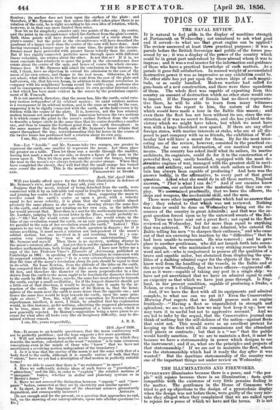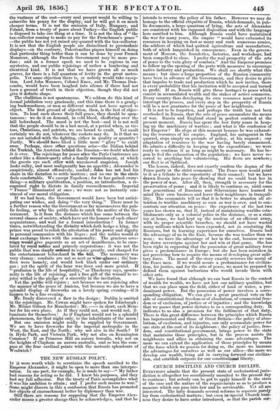THE ILLIIMINATIONS AND FIREWORKS.
GOVERNMENT illuminates because there is a peace, and "the peo plc " will rejoice because there is an illumination ; facts quite compatible with the existence of very little genuine feeling in the matter. The gentlemen in the House of Commons who tried to get up objections to the design of a pyrotechnic display when the design was not before them, were guilty of the very mis- take they alleged when they complained that we are called upon to rejoice for a peace of which we have not the terms. It is not the vastness of the cost—every soul present would be willing to subscribe his penny. for the display, and he will get it on much cheaper terms. It is not the omission of Italy, Hungary, and Poland, from a treaty of peace about Turkey—the English public is disposed to take one thing at a time. It is not the i ea of " the tax-collector coming to make us pay for the Frenchman's peace" —the public has not yet raised any quarrel with the tax-collector. It is not that the English people are disinclined to pyrotechnic displays—on the contrary, Paterfamilias piques himself on doing that particular thing better than it can be done by your French Monsieur, although the French Government may be more pro- fuse ; and in a former epoch we used to be copious in our mysteries, and our public rejoicings of rather a lumbering and theatrical kind. It is not that we have grown all so much graver, for there is a full quantum of levity in the great metro- polis. Yet some objection there is, or nobody would take excep- tion. Lord John Manners, Colonel Knox, and. Mr. Thomas Dun- combe, would have been laughed into silence if there had not been a ground of truth in their objection, though they did not give it definite shape. The ebullition is not spontaneous. We seldom do this kind of formaljubilation very graciously, and this time there is a grudg- ing backwardness, or men so different would not have agreed to object. The first ground of objection, then, is the fact of objec- tion. To lend such shows their full grace, they should be spon- taneous : we do it on demand, in cold blood, chaffering over the bill beforehand. The mood is not the best—and it is not well that the people should be in a bad mood, at a period when, as vic- tors, Christians, and patriots, we are bound to exult. Yet exult certainly we do not, whatever the rockets may do. Is it that we are not satisfied with the fighting, either in quality or quantity ? Partly. We should have liked a little more " glory ', to exult over. Perhaps, since other questions arise—the Italian behind the Turkish, the Austrian behind the Russian—we doubt whether it is over.. The rejoicings for peace after the Paris Conference are rather like a dinner-party after a family reconcilement, at which the guests eye each other with unremoved suspicion. Joseph looks sulky, and most malignantly has no appetite ; Alexander is suspiciously, almost offensively, cordial ; John has not had his share in the dictation to settle matters ; and no one in the circle feels comfortable. We except Napoleon ; for he has gained every- thing—a military qualification, a position, an introduction, a re- eoed. right to dictate in family reconcilements. Imperial
France " illuminated at once ; we were not so instantly con- vinced of our moral obligation.
If we had been, the Government would have been but antici- pating our wishes, and doing " the very thing." There must be a further reason why the Government so far misconceives the pub- lic feeling, or why the public fails to catch the motive of the Go- vernment. Is it from the distance which has come between the several classes of society, which have not the honour of each others' acquaintance, and wait for a formal introduction ? In former times, notwithstanding the divinity which doth hedge a king, the prince was proud to relish the attestation of his power and dignity
in personal communion with his lieges; the nobles would at least exchange blows with the commoalty. The gracious sove- reign wouildoyari-leollasgeants as an act of munificence, to be emu- lated by and princely corporations: it was not the public that was simply ordered to rejoicep-eatly, and charged for the entertainment beforehand in the UlL The mummery was very clumsy : conduits are not so neat as wine-glasses ; the bon- fires were homely, and would look black under our ordinary gas ; yet the spirit of the hour was freer and more genial. If " profusion is the life of hospitality," as Thackeray says, sponta- neity is the life of rejoicing, and a free gift of the wassail to re- joice withal is the pledge of a sincerity in the invitation.
Yet the • public will rejoice ; not because we are rejoicing after the manner of the peace of Amiens, but because we are to have a splendid display of fireworks on a lovely spring evening—if it happen to be a fine evening.
Mr. Brady. discovered a flaw in the design : Dublin is omitted in the rejoicings. Mr. Cowan might have spoken for Edinburgh ; Mr. Milner Gibson for Manchester ; Mr. — in short, each Mem- ber for his own plane. As if they could not, and would not, il- luminate for themselves ! As if England would not be a splendid phenomenon, for.that night only, to the inhabitants of the moon ! But one omission might really be supplied by Government. We are to have fireworks for the imperial metropolis in the West, the East, and the North ; why not also in the South ? If in Hyde Park, and Victoria Park, why not also on Kennington Common? If on Primrose Hill an aurora borealis, why not on the heights of Clapham an aurora australis, and so box the coin- piss at the four cardinal points with the meteoric splendours of Woolwich ?



























 Previous page
Previous page